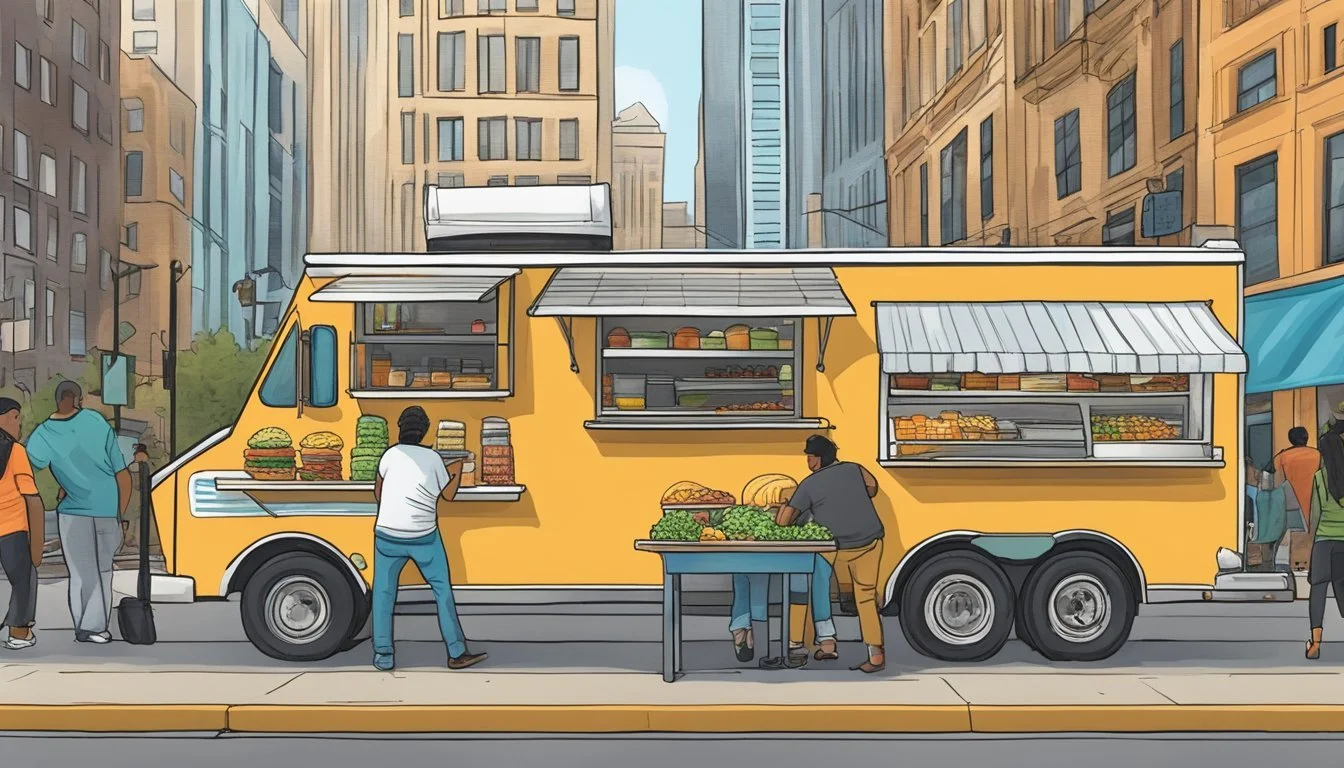Food Truck Laws Houston, Texas
Navigating the Regulations for Mobile Vendors
In Houston, Texas, food trucks have become a vibrant part of the culinary scene, reflecting the city's diverse culture and inventive spirit. However, operating these mobile eateries is governed by a set of regulations that entrepreneurs must navigate. The city's food truck laws are designed to ensure public health and safety while also allowing for the innovative and gastronomic potential of these establishments to flourish.
The regulations touch on a variety of aspects from permitting and health inspections to parking and zoning restrictions. In Houston, food truck operators are required to obtain multiple permits, including a medallion from the health department that signifies compliance with local health codes. Additionally, these vendors must grapple with parking regulations that dictate where they can serve their customers, with specific zones designated for food truck operation. The balance between entrepreneurial freedom and regulatory compliance is a constant in the Houston food truck industry, shaping the experience of both operators and patrons.
Starting a Food Truck Business
When launching a food truck in Houston, one must navigate through specific regulatory procedures. From obtaining necessary registrations to ensuring proper equipment acquisition, the process is meticulous. Proper knowledge of startup costs, insurance, and menu development, along with building a coherent team and forming partnerships, are crucial steps toward establishing a successful mobile food unit.
Business Registration and EIN
Every new food truck business must be registered with the Texas Secretary of State to operate legally. An Employer Identification Number (EIN) is also required for tax purposes. This can be obtained through the IRS once the business structure is decided upon.
Choosing a Truck and Equipment
Selecting the right vehicle is pivotal. The truck should align with Houston's mobile food unit guidelines and be equipped to handle the menu's demands. Installation of commercial-grade kitchen equipment is a necessity for both functionality and compliance with health codes.
Startup Costs and Financing
Initial expenses can range significantly, often falling between $50,000 to $150,000. These costs cover the truck, equipment, permits, and inventory. Some entrepreneurs opt for leases or loans, which underscores the importance of a solid business plan for securing financing.
Insurance Requirements
Insurance is non-negotiable. At a minimum, a food truck business will need vehicle insurance, general liability insurance, and property insurance to protect against an array of potential risks.
Developing a Menu
A well-conceived menu is both an attraction and a logistical consideration, with offerings that should reflect not only customer preferences but also operational capabilities. Freshness, pricing, and prep time are essential factors to consider.
Partnerships and Team Building
Strategic partnerships can offer new opportunities and resources, which can be vital for a new food truck business. Building a reliable team is equally important, as it ensures smooth operation and better customer service.
Each subsection offers insight into the sequential steps that prospective food truck entrepreneurs must take to launch and sustain their mobile food establishments within Houston, Texas.
Legal Requirements and Compliance
In Houston, Texas, operating a food truck involves navigating a series of legal requirements to ensure full compliance with local and state laws. This includes obtaining the necessary permits and licenses, adhering to health and safety regulations, obtaining food handler and manager certifications, ensuring the vehicle meets certain standards, understanding zoning laws for parking, and following local ordinances specific to the food truck industry.
Obtaining Permits and Licenses
Food truck operators are required to secure various permits and licenses to legally operate within Houston. This starts with a City of Houston Food Service Medallion and extends to business registration with the Texas Secretary of State. Operators must provide proof of vehicle insurance and ensure they have all necessary permits before commencing business.
Health and Safety Regulations
Adherence to health and safety regulations is mandatory. The Texas Food Establishment Rules and the local health department set forth the standards that must be met. This includes cleanliness, proper food storage, and temperature controls to prevent foodborne illnesses.
Food Handler and Manager Certifications
Both food handlers and managers must obtain the appropriate certifications. Employees must pass a food handler's course, while at least one individual in the operation must hold a Certified Food Manager Certificate, demonstrating comprehensive knowledge of food safety practices.
Vehicle Inspections and Requirements
Food trucks must pass a vehicle inspection conducted by the Houston Fire Department and the environmental inspection center. This inspection includes checking that the truck is "turned on" to test all aspects of the unit, ensuring that it is fully operational and meets fire safety standards.
Zoning and Parking Regulations
Food trucks must comply with zoning and parking regulations which dictate where and when they can operate. These laws are designed to ensure that food trucks do not obstruct traffic and that they operate in designated areas that are safe for both employees and customers.
Complying with Local Ordinances
In addition to state laws, food truck operators must also comply with city-specific local ordinances. The Houston Health Department provides resources on how to ensure compliance with these localized rules, which may include restrictions on noise levels, waste management, and hours of operation.
Operational Aspects of Running a Food Truck
Running a food truck in Houston requires compliance with various operational criteria including managing the unit, food handling, maintaining water and waste systems, ensuring cleanliness, and adhering to permit renewals.
Managing a Mobile Food Unit
In Houston, operators of mobile food units are required to have their vehicles equipped with specific features as per the city's regulations. A City of Houston Food Service Medallion is mandatory for all mobile food units to operate legally. Furthermore, the mobile food unit must be effectively managed to ensure all mechanical components and food service areas are functioning optimally.
Food Preparation and Service
Preparation and service of food are to be carried out under stringent health and safety standards. These standards are crucial to prevent foodborne illnesses and to maintain customer trust. Each mobile food unit must be designed to facilitate the safe and hygienic preparation, display, serve, and sale of food.
Water Supply and Waste Disposal
Mobile food units must have an accessible supply of potable water for food preparation and cleaning purposes. Equally important is the proper disposal of waste water. Houston's regulations stipulate how these systems should be maintained and operated to ensure sanitation and public health compliance.
Maintenance and Sanitation Protocols
Sanitation is non-negotiable in the food service industry. Mobile food units need regular cleaning and maintenance protocols to keep food preparation areas and equipment sanitized. This includes regular inspection and cleaning schedules which, if not followed, can jeopardize the food truck's ability to operate.
Renewal of Permits and Ongoing Compliance
All permits and licenses must be kept current, and mobile food units must undergo routine inspections to ensure continued compliance with local health and safety regulations. Food truck owners are responsible for monitoring changes in the law and for the timely renewal of permits to prevent any operational interruptions.
Financial and Tax Considerations
Operating a food truck in Houston, Texas, involves understanding the financial nuances and tax obligations to remain compliant with state laws. Owners must navigate the specifics of Texas sales tax, adhere to regular reporting and paying of taxes, and recognize the economic impact these businesses have on the local industry.
Understanding Texas Sales Tax
Food truck operators in the State of Texas are required to collect sales tax on all food and beverage items sold. Currently, the sales tax rate in Houston stands at 8.25%, which combines state, county, and local taxes. It is imperative that food truck businesses register with the Texas Comptroller to legally collect and remit taxes.
Register for a sales tax permit through the Texas Comptroller’s office.
Include the necessary details of the food truck business during the registration.
Reporting and Paying Taxes
Taxes collected must be reported and paid to the Texas Comptroller on a monthly or quarterly basis, depending on the volume of sales. Accurate record-keeping is crucial for reporting sales tax. Food truck owners should be aware of the potential penalties for late or incorrect filings.
Maintain thorough records of all transactions.
Submit tax payments and reports by the designated deadlines.
Food Truck Industry Economic Impact
The food truck industry contributes significantly to Houston's economy, not only through food sales but also through the generated tax revenue. It is essential for food truck operators to comply with tax regulations, as their contributions support state-funded programs and services.
Each food truck contributes to the local economy by engaging in commerce and collecting sales tax.
Complying with tax laws ensures the industry's sustainable growth and positive economic impact.
Special Cases and Additional Considerations
When operating a food truck in Houston, certain contexts demand special attention. Regulations can vary when food trucks operate in proximity to hospitals and schools, during special events, throughout ownership transitions, and in the documentation required for compliance.
Operating Near Hospitals and Schools
Food trucks operating near hospitals or schools must adhere to specific local government regulations aimed at safeguarding public health. These provisions can dictate the distance from the facility, operational times, and menu restrictions to accommodate dietary needs. It is essential to consult with the hospital administration or school board before setting up shop.
Food Trucks at Special Events
Temporary food establishments, such as food trucks at festivals or fairs, may require special event permits. These are issued for limited times and locations and come with health and safety guidelines specific to the event. Food truck operators should ensure these guidelines are strictly followed to avoid penalties.
Adapting to Changes in Ownership
Should there be a change of owner, a Houston food truck must re-notify the local health department. This ensures the new owner is apprised of, and in agreement with, all food safety and operational requirements, including the handling and storage of propane and other hazardous materials.
Requirement for Specific Documentation
Operating a food truck requires maintaining up-to-date required documents such as a valid food dealer's permit, health department clearance, and fire safety inspection if propane is used. This includes insurance papers and registration with the Texas Secretary of State and Comptroller, as illustrated in the guidelines from the Houston Health Department.
Resources and Additional Support
The section outlines essential resources and support avenues for operators of food trucks in Texas. It includes guidance for connecting with the local food truck community, understanding Houston and Texas state guidelines, as well as accessing professional associations and networks.
Connecting with the Food Truck Community
The Houston food truck community is vibrant and provides an informal network of support for new and existing food truck owners. Food truck operators may find value in engaging with this community for mentorship, experience sharing, and gaining insights on operational best practices. Platforms such as Houston Food Truck Catering facilitate these connections and also offer resources for mobile food units.
Houston and Texas State Guidelines
For compliance with local regulations, food truck operators must acquaint themselves with the Houston Health Department regulations and the Texas Health and Safety Code concerning retail food establishments. These guidelines are important for ensuring public health and safety and include specific requirements for mobile food units, such as permits, inspections, and operational standards. The Houston Health Department provides comprehensive information, while the statewide regulations can be found through resources like the Texas Commission on Environmental Quality.
Professional Associations and Networks
Joining professional associations and networks can offer food truck owners advocacy, education, and business opportunities. They are often a source of the latest industry updates and can provide access to events and conferences that are beneficial for networking. The Texas Restaurant Association provides resources for all types of foodservice entities, including food trucks, and can help operators navigate the complexities of the food truck business.





